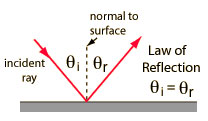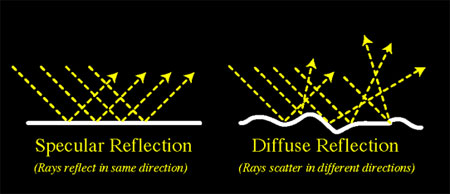
Source: reflaw, Reflection-plane-mirrors
This lesson will help you to find images formed in a plane mirror.
Plane mirrors are usually flat pieces of glass or plastic with a thin coat of metal on them to form a reflective surface. The metal used to be silver, but is usually aluminum today. In the past, mirrors were made of polished brass or bronze.
A reflection is caused by light, sound or any other wave bouncing back at the surface of an object that it strikes.
The Law of Reflection states that when an incoming ray of light strikes a plane mirror, its angle of incidence with the normal line is equal to the angle of reflection of the ray with the normal line.

Source: reflaw, Reflection-plane-mirrors
When light bounces off a surface, the reflection can be specular or diffuse. Specular reflection occurs when the light rays bounce off in the same direction from a smooth surface, like from a mirror, the surface of water or shiny metal. Diffuse reflection occurs when light is scattered off a rough surface, such as flat paint, rough concrete or a cloth towel.
